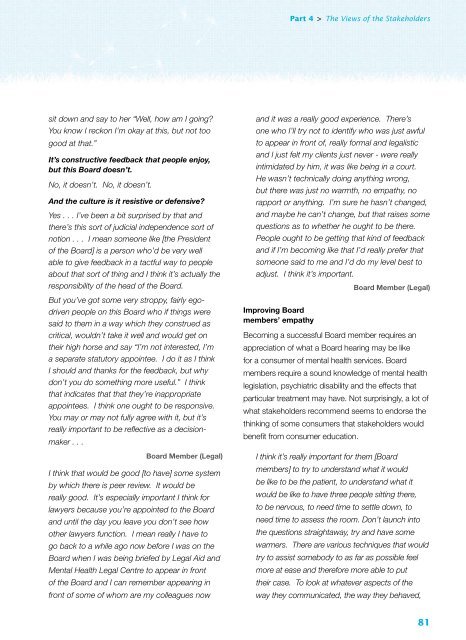Lacking Insight - Community Law
Lacking Insight - Community Law
Lacking Insight - Community Law
- No tags were found...
Create successful ePaper yourself
Turn your PDF publications into a flip-book with our unique Google optimized e-Paper software.
Part 4 > The Views of the Stakeholderssit down and say to her “Well, how am I going?You know I reckon I’m okay at this, but not toogood at that.”It’s constructive feedback that people enjoy,but this Board doesn’t.No, it doesn’t. No, it doesn’t.And the culture is it resistive or defensive?Yes . . . I’ve been a bit surprised by that andthere’s this sort of judicial independence sort ofnotion . . . I mean someone like [the Presidentof the Board] is a person who’d be very wellable to give feedback in a tactful way to peopleabout that sort of thing and I think it’s actually theresponsibility of the head of the Board.But you’ve got some very stroppy, fairly egodrivenpeople on this Board who if things weresaid to them in a way which they construed ascritical, wouldn’t take it well and would get ontheir high horse and say “I’m not interested, I’ma separate statutory appointee. I do it as I thinkI should and thanks for the feedback, but whydon’t you do something more useful.” I thinkthat indicates that that they’re inappropriateappointees. I think one ought to be responsive.You may or may not fully agree with it, but it’sreally important to be reflective as a decisionmaker. . .Board Member (Legal)I think that would be good [to have] some systemby which there is peer review. It would bereally good. It’s especially important I think forlawyers because you’re appointed to the Boardand until the day you leave you don’t see howother lawyers function. I mean really I have togo back to a while ago now before I was on theBoard when I was being briefed by Legal Aid andMental Health Legal Centre to appear in frontof the Board and I can remember appearing infront of some of whom are my colleagues nowand it was a really good experience. There’sone who I’ll try not to identify who was just awfulto appear in front of, really formal and legalisticand I just felt my clients just never - were reallyintimidated by him, it was like being in a court.He wasn’t technically doing anything wrong,but there was just no warmth, no empathy, norapport or anything. I’m sure he hasn’t changed,and maybe he can’t change, but that raises somequestions as to whether he ought to be there.People ought to be getting that kind of feedbackand if I’m becoming like that I’d really prefer thatsomeone said to me and I’d do my level best toadjust. I think it’s important.Board Member (Legal)Improving Boardmembers’ empathyBecoming a successful Board member requires anappreciation of what a Board hearing may be likefor a consumer of mental health services. Boardmembers require a sound knowledge of mental healthlegislation, psychiatric disability and the effects thatparticular treatment may have. Not surprisingly, a lot ofwhat stakeholders recommend seems to endorse thethinking of some consumers that stakeholders wouldbenefit from consumer education.I think it’s really important for them [Boardmembers] to try to understand what it wouldbe like to be the patient, to understand what itwould be like to have three people sitting there,to be nervous, to need time to settle down, toneed time to assess the room. Don’t launch intothe questions straightaway, try and have somewarmers. There are various techniques that wouldtry to assist somebody to as far as possible feelmore at ease and therefore more able to puttheir case. To look at whatever aspects of theway they communicated, the way they behaved,81
















